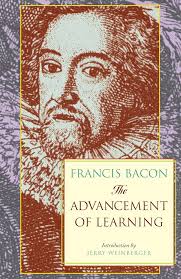The Advancement of Learning Page #36
The Advancement of Learning, published by Francis Bacon in 1605, is a foundational text in the history of science and philosophy. In this work, Bacon advocates for empirical research and the systematic organization of knowledge, laying the groundwork for the scientific method. The book critiques existing scholarly practices and proposes a new approach to learning based on observation and experimentation. It marks a significant shift towards modern scientific inquiry.
- Year:
- 1605
- 1,169 Views
Submitted by acronimous on August 11, 2024
Modified by acronimous on August 11, 2024
men have found the way to reduce them to a few simple letters. So that it is not the insufficiency or incapacity of man’s mind, but it is the remote standing or placing thereof that breedeth these mazes and incomprehensions; for as the sense afar off is full of mistaking, but is exact at hand, so is it of the understanding, the remedy whereof is, not to quicken or strengthen the organ, but to go nearer to the object; and therefore there is no doubt but if the physicians will learn and use the true approaches and avenues of nature, they may assume as much as the poet saith: “Et quoniam variant morbi, variabimus artes; Mille mali species, mille salutis erunt.” Which that they should do, the nobleness of their art doth deserve: well shadowed by the poets, in that they made Æsculapius to be the son of [the] sun, the one being the fountain of life, the other as the second-stream; but infinitely more honoured by the example of our Saviour, who made the body of man the object of His miracles, as the soul was the object of His doctrine. For we read not that ever He vouchsafed to do any miracle about honour or money (except that one for giving tribute to Cæsar), but only about the preserving, sustaining, and healing the body of man. (3) Medicine is a science which hath been (as we have said) more professed than laboured, and yet more laboured than advanced; the labour having been, in my judgment, rather in circle than in progression. For I find much iteration, but small addition. It considereth causes of diseases, with the occasions or impulsions; the diseases themselves, with the accidents; and the cures, with the preservations. The deficiences which I think good to note, being a few of many, and those such as are of a more open and manifest nature, I will enumerate and not place. (4) The first is the discontinuance of the ancient and serious diligence of Hippocrates, which used to set down a narrative of the special cases of his patients, and how they proceeded, and how they were judged by recovery or death. Therefore having an example proper in the father of the art, I shall not need to allege an example foreign, of the wisdom of the lawyers, who are careful to report new cases and decisions, for the direction of future judgments. This continuance of medicinal history I find deficient; which I understand neither to be so infinite as to extend to every common case, nor so reserved as to admit none but wonders: for many things are new in this manner, which are not new in the kind; and if men will intend to observe, they shall find much worthy to observe. (5) In the inquiry which is made by anatomy, I find much deficience: for they inquire of the parts, and their substances, figures, and collocations; but they inquire not of the diversities of the parts, the secrecies of the passages, and the seats or nestling of the humours, nor much of the footsteps and impressions of diseases. The reason of which omission I suppose to be, because the first inquiry may be satisfied in the view of one or a few anatomies; but the latter, being comparative and casual, must arise from the view of many. And as to the diversity of parts, there is no doubt but the facture or framing of the inward parts is as full of difference as the outward, and in that is the cause continent of many diseases; which not being observed, they quarrel many times with the humours, which are not in fault; the fault being in the very frame and mechanic of the part, which cannot be removed by medicine alterative, but must be accommodated and palliated by diets and medicines familiar. And for the passages and pores, it is true which was anciently noted, that the more subtle of them appear not in anatomies, because they are shut and latent in dead bodies, though they be open and manifest in life: which being supposed, though the inhumanity of anatomia vivorum was by Celsus justly reproved; yet in regard of the great use of this observation, the inquiry needed not by him so slightly to have been relinquished altogether, or referred to the casual practices of surgery; but might have been well diverted upon the dissection of beasts alive, which notwithstanding the dissimilitude of their parts may sufficiently satisfy this inquiry. And for the humours, they are commonly passed over in anatomies as purgaments; whereas it is most necessary to observe, what cavities, nests, and receptacles the humours do find in the parts, with the differing kind of the humour so lodged and received. And as for the footsteps of diseases, and their devastations of the inward parts, impostumations, exulcerations, discontinuations, putrefactions, consumptions, contractions, extensions, convulsions, dislocations, obstructions, repletions, together with all preternatural substances, as stones, carnosities, excrescences, worms, and the like; they ought to have been exactly observed by multitude of anatomies, and the contribution of men’s several experiences, and carefully set down both historically according to the appearances, and artificially with a reference to the diseases and symptoms which resulted from them, in case where the anatomy is of a defunct patient; whereas now upon opening of bodies they are passed over slightly and in silence. (6) In the inquiry of diseases, they do abandon the cures of many, some as in their nature incurable, and others as past the period of cure; so that Sylla and the Triumvirs never proscribed so many men to die, as they do by their ignorant edicts: whereof numbers do escape with less difficulty than they did in the Roman prescriptions. Therefore I will not doubt to note as a deficience, that they inquire not the perfect cures of many diseases, or extremities of diseases; but pronouncing them incurable do enact a law of neglect, and exempt ignorance from discredit. (7) Nay further, I esteem it the office of a physician not only to restore health, but to mitigate pain and dolors; and not only when such mitigation may conduce to recovery, but when it may serve to make a fair and easy passage. For it is no small felicity which Augustus Cæsar was wont to wish to himself, that same Euthanasia; and which was specially noted in the death of Antoninus Pius, whose death was after the fashion, and semblance of a kindly and pleasant sheep. So it is written of Epicurus, that after his disease was judged desperate, he drowned his stomach and senses with a large draught and ingurgitation of wine; whereupon the epigram was made, Hinc Stygias ebrius hausit aquas; he was not sober enough to taste any bitterness of the Stygian water. But the physicians contrariwise do make a kind of scruple and religion to stay with the patient after the disease is deplored; whereas in my judgment they ought both to inquire the skill, and to give the attendances, for the facilitating and assuaging of the pains and agonies
Translation
Translate and read this book in other languages:
Select another language:
- - Select -
- 简体中文 (Chinese - Simplified)
- 繁體中文 (Chinese - Traditional)
- Español (Spanish)
- Esperanto (Esperanto)
- 日本語 (Japanese)
- Português (Portuguese)
- Deutsch (German)
- العربية (Arabic)
- Français (French)
- Русский (Russian)
- ಕನ್ನಡ (Kannada)
- 한국어 (Korean)
- עברית (Hebrew)
- Gaeilge (Irish)
- Українська (Ukrainian)
- اردو (Urdu)
- Magyar (Hungarian)
- मानक हिन्दी (Hindi)
- Indonesia (Indonesian)
- Italiano (Italian)
- தமிழ் (Tamil)
- Türkçe (Turkish)
- తెలుగు (Telugu)
- ภาษาไทย (Thai)
- Tiếng Việt (Vietnamese)
- Čeština (Czech)
- Polski (Polish)
- Bahasa Indonesia (Indonesian)
- Românește (Romanian)
- Nederlands (Dutch)
- Ελληνικά (Greek)
- Latinum (Latin)
- Svenska (Swedish)
- Dansk (Danish)
- Suomi (Finnish)
- فارسی (Persian)
- ייִדיש (Yiddish)
- հայերեն (Armenian)
- Norsk (Norwegian)
- English (English)
Citation
Use the citation below to add this book to your bibliography:
Style:MLAChicagoAPA
"The Advancement of Learning Books." Literature.com. STANDS4 LLC, 2025. Web. 10 Mar. 2025. <https://www.literature.com/book/the_advancement_of_learning_3165>.








Discuss this The Advancement of Learning book with the community:
Report Comment
We're doing our best to make sure our content is useful, accurate and safe.
If by any chance you spot an inappropriate comment while navigating through our website please use this form to let us know, and we'll take care of it shortly.
Attachment
You need to be logged in to favorite.
Log In